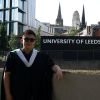
Xinlin Chao
- Course: MA Society Culture and Media
- Year of graduation: January 2022
- Nationality: Chinese
Please tell us a bit about yourself.
I am from Changsha, a city in central China. I received my Bachelor of Arts degree in 2020 from Xi'an Polytechnic University. My undergraduate course included many fundamental theoretical courses in journalism, communication and literary history, as well as many practical opportunities, including television camera work, programme planning and audio-video production. I am very passionate about the media industry and I have been involved in internships in variety shows, news and radio programmes at Hunan Broadcasting System.
What made you want to apply to your course and to Leeds?
After completing my undergraduate degree and the related internship, I think that continuing to learn new things will be more helpful for my future career. There is no doubt that the University of Leeds was a good choice. Firstly, Leeds is the third largest city in the UK and has a very good urban infrastructure and attractive cultural facilities such as shopping, music and sports. In addition, the University of Leeds is one of the world's leading universities with the most experienced teachers and the most approachable school staff. Finally, the Society Culture and Media programme is also very interesting, as it combines a wide range of humanities subjects.
What is it that makes you passionate about your area of study?
The most important thing you can do to be passionate about your studies is to find an interest in academics. Sociology is a much broader subject and you can link your interests to the subject to study the areas that interest you most. Secondly, there is also a need to remain curious about what is topical in social life. Many cultural phenomena in social life are very interesting. For example, when I find an injustice in a news report in the media, I try to find out the deeper reasons for it, which may have implications about race, gender and other social aspects.
What do you think of your course so far?
There is no doubt that it is of great interest to study inequality in the media. This is because common media-produced content such as advertising, news and films are thoroughly integrated into our daily lives, but some inequalities are actually reflected in this content, either consciously or unconsciously. The stereotypes embodied in these inequalities deserve to be brought to the attention of researchers, and the exploration of these phenomena can help promote the egalitarian development of society.
What would you say about the learning facilities at the University of Leeds?
Because of Covid-19, the teaching pattern became very different this year. But I have to say that the online teaching actually helped me to learn better. This is because I can access the content of the lecture several times and listen to the teacher's explanations repeatedly for areas of confusion. The offline facilities were also well equipped for use, the library resources were secure and easy to access, and the offline seminars provided opportunities for discussion in a safe and controlled manner. I really liked the combination of online and offline teaching, which increased my freedom of learning.
How would you describe the student support and community at Leeds? Have you taken part in any co-curricular or social events you would like to mention?
Everything about the school's support was just too perfect. For your studies you can easily contact your teachers and classmates via email, and you can ask questions to everyone on Teams. Life wise, it is very helpful to receive weekly greeting emails from the relevant team at the college, which contains a schedule of the college's activities for the past week.
What other activities are available for students to take part in outside of their studies, and which ones have you tried out yourself?
Every week there are many events on the Leeds University Union (LUU) website to choose from, and even during Covid-19, many of the online events are very good options. I once took part in a campus tour organised by the School and LUU, where we learned about the history of the campus with the teachers and had lunch together, which was an unforgettable experience! Of course there are many more activities that I have yet to discover, and they are very varied.
What do you think about Leeds as a city?
Leeds is the third largest city in the UK and it has basically everything you need. Small bands, Leeds United football team, museums and exhibition halls can cater for a diverse range of cultural needs. Global cuisine can also be found in the city centre to satisfy your appetite. Leeds is a great place to live.
What would you say to anyone thinking of applying to your course?
I highly recommend the Society Culture, Media project, which provides a key to exploring the world of culture. If you maintain a positive attitude towards your studies, you will learn about many deep-rooted social issues, the exploration of which will help you to gain a fuller understanding of the society you live in, the culture you feel, and the media you see.
What do you plan to do once you’ve finished your course? What are you career aspirations?
After the course, I will say a brief farewell to the UK via travel and return to China to look for a social service type job. In the further future, I will also consider pursuing a PhD and I expect I will return to Leeds.
Any other comment you would like to make?
A year is a short time, especially with the impact of the epidemic, and many opportunities to experience the city and the school have been lost. Everything is so wonderful here and I am very sad to say goodbye. Thank you from the bottom of my heart to the city of Leeds, the teachers and the staff.

